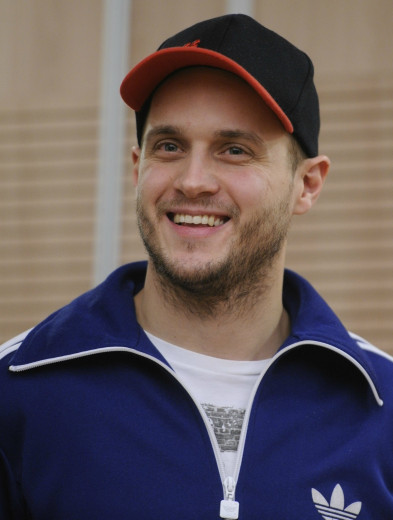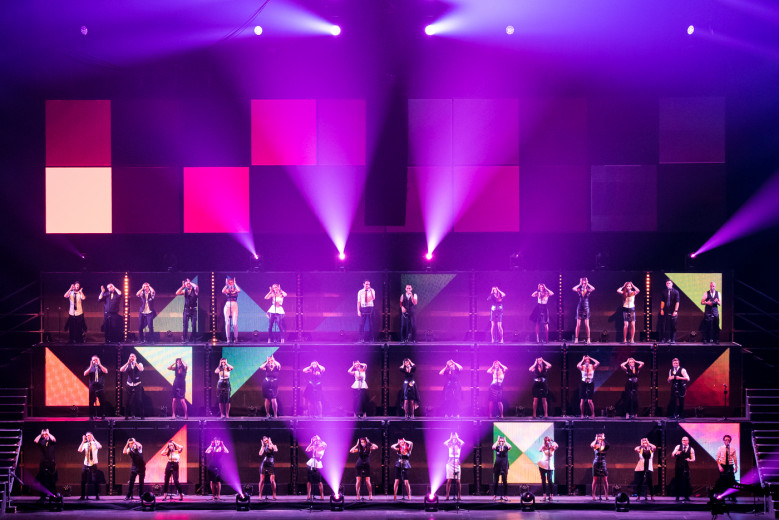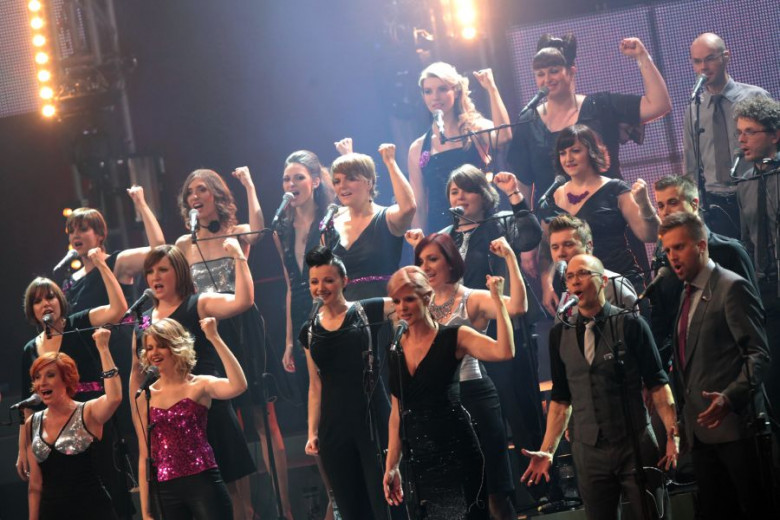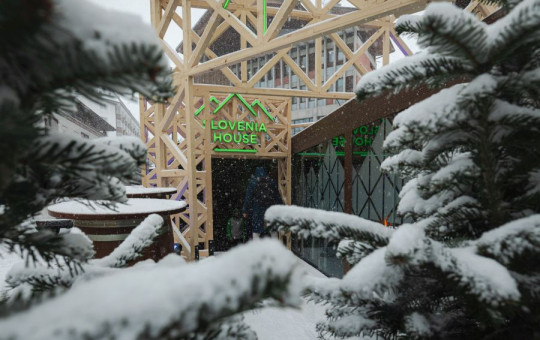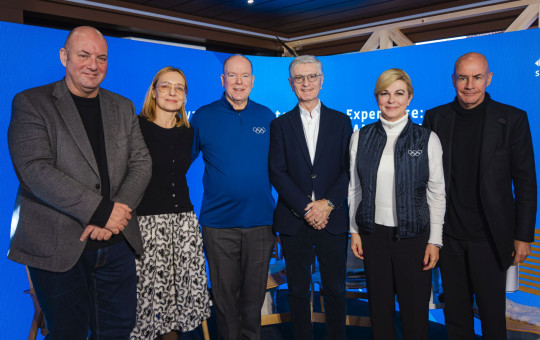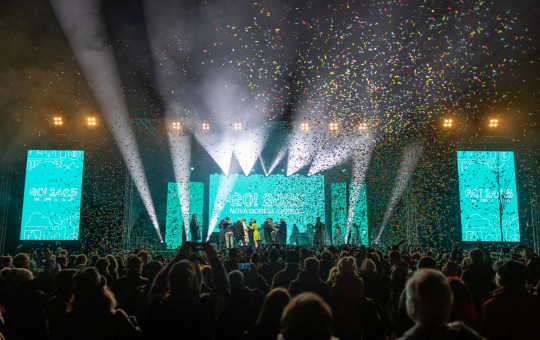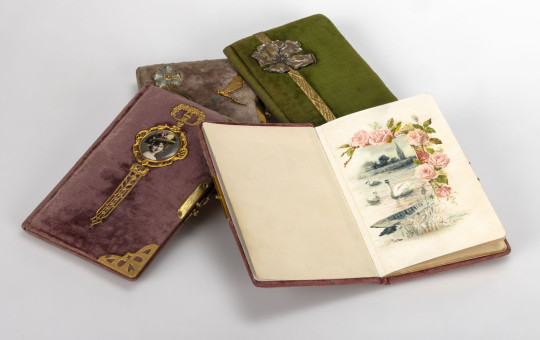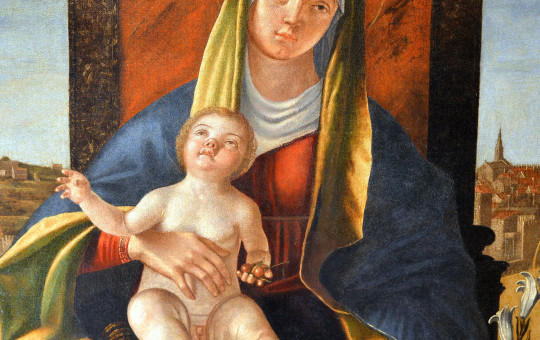Date: 26. May 2022
Time to read: 3 min
A promotional video was made in the scope of Slovenia’s Presidency of the Council of the European Union, which is special in many ways. Its direction was entrusted to the Slovenian director Mitja Okorn, who used the lyrics of Zdravljica, the Slovenian national anthem, and archive footage of the formation of the European Union and Slovenia to create a story of Slovenia’s Presidency.
An inspirational presentation of the magnificence of the European idea and Slovenia within it
A promotional video was made in the scope of Slovenia’s Presidency of the Council of the European Union, which is special in many ways. Its direction was entrusted to the Slovenian director Mitja Okorn, who used the lyrics of Zdravljica, the Slovenian national anthem, and archive footage of the formation of the European Union and Slovenia to create a story of Slovenia’s Presidency.
The promotional video was a major challenge for the creators. The team of the director and music producer had to include the idea of European integration, the values on which such integration is based, the 30th anniversary of Slovenia and the priority objectives of Slovenia’s Presidency into the finished product. The script also had to follow the lyrics of Zdravljica, written by the giant of Slovenian poetry, France Prešeren, in the mid-19th century.
“I am very delighted to have been chosen as director for this presentation film, which blends with my vision of directing. I have always wanted to direct something like this, some kind of art project on Independence Day or on any other important date for the country. I imagined the video as a powerful musical concert which will satisfy all tastes, addressing the young and the old ...”, said Okorn.
The European dimension of the Slovenian anthem
In Zdravljica, the poet France Prešeren, a notable representative of his time and thus moved by the rebirth of nations in the mid-19th century, highlighted patriotism, the idea of freedom and the equality of all nations. The basis of the poem was the domestic Slovenian world, to whom the democratic call in the work is addressed. The poem, however, also addresses the broader idea about the inseparable links between all (European) nations. This is especially evident in the seventh verse, which has been the Slovenian anthem since its independence.
Zdravljica, which was set to music by the a capella group Perpetuum Jazzile as the basis for the video, plays in the background of Slovenian and European archive footage.
“Zdravljica, with all of its eight verses, was made in a fresh way, whereby we considered the core directions of the scenario: Europe after the two world wars as it set out on its path to peace, the establishment of the Slovenian country in time and space, marked by the supremacy of freedom and other core values of the European integration process, the challenges of the EU through time, an ambitious EU, Slovenia as an EU Member State and its 30th anniversary, the strengthening of the EU’s resilience, the European way of life, a safe EU and the development power and economic renewal of the EU”, explained the director Mitja Okorn.
Okorn wanted to include footage that would move people. This does not mean that the subject matter includes only the greatest of things, as it also includes hard and unpleasant events that we regret, but have a different viewpoint from another perspective of time. RTV Slovenija found some footage in their archives, other clips were obtained from international agencies, and all of them show events surrounding the establishment of the European Union and Slovenia in an interesting and considered way. Rok Omahen, a documentalist who works at the TV archives at RTV Slovenija, said that this was an extensive project which, based on the quantity of the archived footage, was better compared to a documentary than a promotional video, which also shows the dedication of the director and the team to the work.
“I was pleasantly surprised about the approach of the director and his team, because they took more than ten hours of their time to go through all of the materials in order to choose the most appropriate clips”, he added.
Mitja Okorn worked with the Polish composer Lukasz Targosz, who prepared the musical arrangement for the implementation of Zdravljica. The implementation was given to the vocal group Perpetuum Jazzile, who included their know-how and unique talent.
“I hope that this interpretation of Zdravljica will be used for a very long time and enthuse people. I wanted to create a somewhat explosive presentation of the magnificence of the European idea and Slovenia within it. The video features the band Perpetuum Jazzile and the Tarkowski Orchestra under the leadership of Jacek Tarkowski – an ideal combination of something very beautiful and heart-warming”, said Okorn. The band was also joined by a young girl who sang the introductory verses, with the presentation being in both Slovene and English versions.
Zdravljica has a special, almost mythical meaning for Slovenians. Even Mitja Okorn was somewhat fearful during the creation of the video, so as not to dishonour its importance and tradition.
“I had great respect for this piece of music during the creation of the video. And fear is good in the creative process, fright generates respect for the project, which is always good. Above all, I wish that people would play the music with joy, not just during Slovenia’s Presidency of the EU Council, but also afterwards, and I hope the song will be widely recognised, popular and prominent. That people will adopt it and take it as something of their own in their everyday lives.”
Mitja Okorn – a director with enviable global achievements
Mitja Okorn, the Slovenian director who just released his Hollywood debut Life in a Year, starring Cara Delevingne and Jaden Smith, has been enthusiastically realising his cinematographic vision for some years now in Poland. He directed his first feature film Tu in tam (Here and there) in 2005 in Slovenia, followed by two films, Pisma sv. Nikolaju (Letters to Santa) (2011) and Planet samskih (Planeta Singli) (2016), which he shot in Poland and which became international hits. He has also written some screenplays.
Even your personal story is European. Years ago you moved to Poland to pursue your career, and even to the USA. You have achieved enviable global achievements as a director.
Before I started working in the USA, I had to obtain many permits; these take much of your time, willpower, strength. This is why I am satisfied that the EU managed to connect the way it did and that there are not that many bureaucratic barriers. In Poland, I do not have to deal with as much bureaucracy because the agreements that apply there apply for the entire EU. Poland is very much like Slovenia, with the difference of it being 20 times larger.
What else do you do, besides directing?
I write scripts for new projects, I am also preparing a major project about Dražen Petrović, one of the best basketball players in the eighties and Croatian athletes in general, and Vlado Divac, a top Serbian basketball player, as well as the team that won everything. Slovenia was a part of that in those times because we were part of Yugoslavia. I am convinced that the project could be interesting for the entire world, and not limited to Slovenia. This is a story of friendship and about how war destroys this and makes enemies of people who were friends in the past. The movie will also be topical today, when global frictions are increasing. When we divide ourselves as being left or right, we tend to talk less, because politics destroys us, which is unreasonable because most people have many more common interests in common than those that divide them. Two American producers are also taking part in the project. I think the film is important because these two basketball players opened the door for today’s players, like Dragić, Dončić and other European stars who are achieving international fame. This movie could also be the first Slovenian international hit.
You became a father not long ago.
Yes, this is my first real child, as all my movies are my movie children. Just like I am doing now with my child or my family, I used to dedicate all my heart and soul to every one of my movies.
Do you often return to Slovenia and how do you see it from your current perspective – from abroad?
When I came to Poland, I was pleasantly surprised. I found that they are ahead of us in certain things, and that we were doing them injustice with our views. They were quickly rid of communism and adopted capitalism, which had a favourable impact on their economy. On the other hand the Polish see Slovenia as heaven on Earth, because they’ve been to the coast and to Planica for the ski jump events, and so on. They see Slovenia as a very beautiful and advanced country. So for me to know both places very well, and the impressions they have of each other, seems a bit funny and weird to me sometimes. Even my movies, which are popular in Slovenia, show Poland in a way that is different to what we are used to. Most Polish movies show war and history in a gloomy and grey manner. While my movies are very colourful, they include beautiful locations, beautiful people, and beautiful Warsaw. And then people say that they didn’t know that Poland was so beautiful. So people see Poland in a different light because of my movies, and some even decide to study Polish because of them. All this is a confirmation that movies can be good marketing for a country.
What do you miss the most from Slovenia when living abroad?
My family and friends, and I miss the so-called hotemaški kruhki, a kind of bread, very much, which I purchase at Kruhkarija Gorjanc in Hotemaž in Preddvor. Every time I fly to Brnik, I go and buy this bread from a store is near the airport. I like eating, and I also miss fried cheese, which is better in Slovenia than it is in Poland, and Kaiserschmarrn, a shredded pancake... I also miss the location of Slovenia – the sea and the mountains are all an hour’s drive away. In Poland such a drive can last for up to five hours. Even Ljubljana has become a beautiful city in these last few years, which I like to visit.
What is, in short, your association with the 30th anniversary of Slovenia’s independence?
The independent state of Slovenia is definitely better than the former Yugoslavia, which was a sort of an artificial formation, artificially maintained with various loans that would have fallen apart in any case. I would be happy, though, if we could manage to get together again in some other way. The Yugoslav market had a population of some 24 million, and having all that open to services again seems like a good thing to me. The Balkan market was closed with the disintegration of Yugoslavia, but at the same time, Europe, with its population of hundreds of millions, has opened up to us, which is also good.

